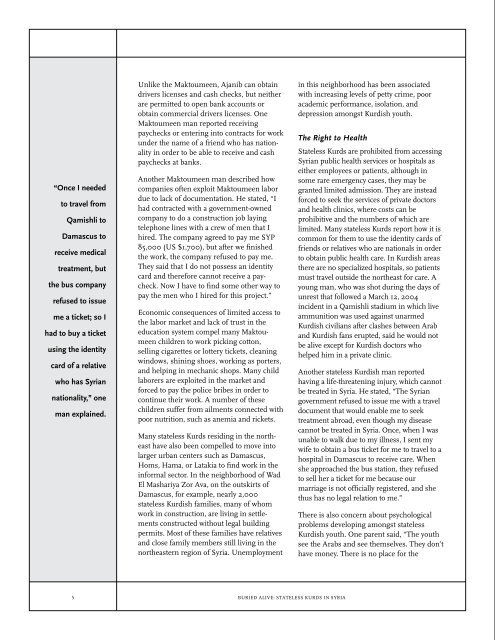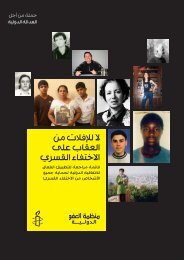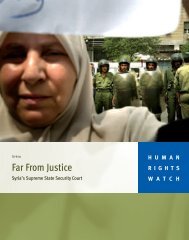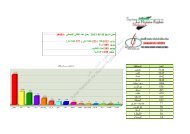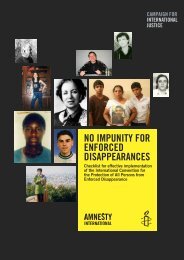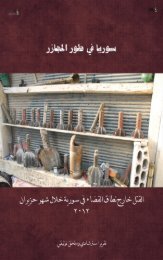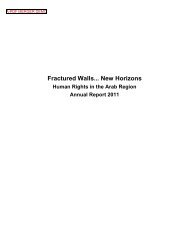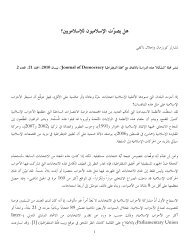BURIED ALIVE
BURIED ALIVE
BURIED ALIVE
Create successful ePaper yourself
Turn your PDF publications into a flip-book with our unique Google optimized e-Paper software.
“Once I neededto travel fromQamishli toDamascus toreceive medicaltreatment, butthe bus companyrefused to issueme a ticket; so Ihad to buy a ticketusing the identitycard of a relativewho has Syriannationality,” oneman explained.Unlike the Maktoumeen, Ajanib can obtaindrivers licenses and cash checks, but neitherare permitted to open bank accounts orobtain commercial drivers licenses. OneMaktoumeen man reported receivingpaychecks or entering into contracts for workunder the name of a friend who has nationalityin order to be able to receive and cashpaychecks at banks.Another Maktoumeen man described howcompanies often exploit Maktoumeen labordue to lack of documentation. He stated, “Ihad contracted with a government-ownedcompany to do a construction job layingtelephone lines with a crew of men that Ihired. The company agreed to pay me SYP85,000 (US $1,700), but after we finishedthe work, the company refused to pay me.They said that I do not possess an identitycard and therefore cannot receive a paycheck.Now I have to find some other way topay the men who I hired for this project.”Economic consequences of limited access tothe labor market and lack of trust in theeducation system compel many Maktoumeenchildren to work picking cotton,selling cigarettes or lottery tickets, cleaningwindows, shining shoes, working as porters,and helping in mechanic shops. Many childlaborers are exploited in the market andforced to pay the police bribes in order tocontinue their work. A number of thesechildren suffer from ailments connected withpoor nutrition, such as anemia and rickets.Many stateless Kurds residing in the northeasthave also been compelled to move intolarger urban centers such as Damascus,Homs, Hama, or Latakia to find work in theinformal sector. In the neighborhood of WadEl Mashariya Zor Ava, on the outskirts ofDamascus, for example, nearly 2,000stateless Kurdish families, many of whomwork in construction, are living in settlementsconstructed without legal buildingpermits. Most of these families have relativesand close family members still living in thenortheastern region of Syria. Unemploymentin this neighborhood has been associatedwith increasing levels of petty crime, pooracademic performance, isolation, anddepression amongst Kurdish youth.The Right to HealthStateless Kurds are prohibited from accessingSyrian public health services or hospitals aseither employees or patients, although insome rare emergency cases, they may begranted limited admission. They are insteadforced to seek the services of private doctorsand health clinics, where costs can beprohibitive and the numbers of which arelimited. Many stateless Kurds report how it iscommon for them to use the identity cards offriends or relatives who are nationals in orderto obtain public health care. In Kurdish areasthere are no specialized hospitals, so patientsmust travel outside the northeast for care. Ayoung man, who was shot during the days ofunrest that followed a March 12, 2004incident in a Qamishli stadium in which liveammunition was used against unarmedKurdish civilians after clashes between Araband Kurdish fans erupted, said he would notbe alive except for Kurdish doctors whohelped him in a private clinic.Another stateless Kurdish man reportedhaving a life-threatening injury, which cannotbe treated in Syria. He stated, “The Syriangovernment refused to issue me with a traveldocument that would enable me to seektreatment abroad, even though my diseasecannot be treated in Syria. Once, when I wasunable to walk due to my illness, I sent mywife to obtain a bus ticket for me to travel to ahospital in Damascus to receive care. Whenshe approached the bus station, they refusedto sell her a ticket for me because ourmarriage is not officially registered, and shethus has no legal relation to me.”There is also concern about psychologicalproblems developing amongst statelessKurdish youth. One parent said, “The youthsee the Arabs and see themselves. They don’thave money. There is no place for the<strong>BURIED</strong> <strong>ALIVE</strong>: STATELESS KURDS IN SYRIA


